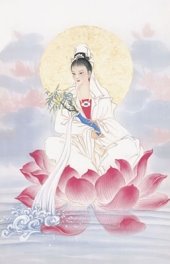 [Image Source]
[Image Source]I went to see the DaVinci Code last night (I read the book a few weeks back). My basic impression: not as good as the book—but what movie ever is? However, it was still worth watching, although there were some serious deviations from the book that they did not flesh out thoroughly. While the book & movie are labeled as fiction, they contained enough historical references and truths for people to mistake entirely fictional aspects as true. One of my best friends, an Evangelical Christian pastor (and history major in college) has told me that people from every class of life have already quoted to him as true several events as portrayed in the book that are patently false from a historical perspective.
I think Joseph Campbell said it best, as he so often did: "One of the great calamities of contemporary life is that the religions that we have inherited have insisted on the concrete historicity of their symbols." The value of this book is not that it is presenting to us an alternative
history to Christianity. The value is in showing people that the historical truth of the stories of religions are of little importance compared to their symbolism.
Religions speak to us because they answer, in symbolic, poetic form, questions that we cannot logically answer any other way. Back in the time when Genesis was written, science was not capable of determining any truths about the beginning of the universe, so religion answered that question. Today, many aspects of nature that originally required religious explanation are now modeled by science--weather patterns, meteor showers, eclipses. Does this make the old religious stories about these events meaningless? Yes, from the standpoint of understanding the events as external natural occurrences. No, from the standpoint of gaining insight into the similarities of such events to aspects of our
psyches. The story of Genesis, which science has easily disproved as a literally true explanation of the evolution of the planet, still has much value through its ability to instill in Christians a wonder and awe of God and his unconditional love. Religious stories still have value to our psyches, are still necessary aspects of our mental makeup, that should work in conjunction with science, not as directly opposed to it.
Our psyches, our mental consciousness, our emotions, are things that science has not been able to explain yet. Hence, these are the topics for which religion still holds the most value. We do not truly know how consciousness works, why (if there is a why!) we have it. Archetypes abound in our minds, reflecting in our actions and thinking, and we're almost always fully unconscious of that fact. Religion provides the symbols that help us explain, and work with, such subjective aspects of ourselves. The ancient Greeks, to name just one example, had a thorough mythology to represent the archetypal substance of our minds.
Back to the DaVinci Code, the value of the book is to show people that, for a religion to have meaning, the symbology of it must correspond to one's experiences, must instill awe in the practitioner for the world around him, and provide a satisfactory explanation of his experiences that he cannot find elsewhere. The problem is that people don't seek out and enact these symbols in their lives anymore—we have too much to worry about, to much to do. We cannot just be given symbols and have that have any real value to us; we must make the symbols our own, seek out the meaning of the symbols in our lives. The value of the DaVinci Code is that it shows people that the
Sacred Feminine is an archetype within us, despite some people's denials, that requires an associated symbol in our religions. In the book,
***SPOILER WARNING***, they chose not to publicly release the historical truth that Jesus' bloodline still exists. They chose to allow people to discover for themselves the need for the Sacred Feminine in their own lives, in whatever symbols speak to them, as individuals.






